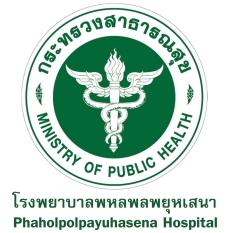Malignancy-related hypercalcaemia in cancer: prognosis and survival outcome
Abstract
Objective: This study investigated survival outcome and prognosis factors in a contemporary series of patient with malignancy-related hypocalcaemia.Patients and method: retrospective analysis of 60 in-patients with solid cancer hospitalized at Paholponphrayuhasena during 2016-2020. The univariate and multivariate analysis were performed to evaluate prognostic factor and Kaplan-Meier method present survival outcome.
Results: The patients had mean age 63 years and the majority had squamous cell carcinoma (64%). Lung cancer was the most frequency disease subsequence head & neckand breast cancer. Only 42% received specific treatment, surgery 13%, chemotherapy 12%, radiation 5% and multi-modalities 12%. Mean calcium level was 15.1 mg/dL which 25% found hypocalcaemia concurrent with diagnosis of cancer and 33% had central neurological symptom. Median overall survival was 1.98 months (95% CI 0.99-2.97). Univariate analysis showed that non-squamous cell (P=0.029), chemotherapy (P=0.008) or multi-modalities treatment (P=0.018), non metastatic cancer (P=0.016) and bisphosphanate (P=0.005) use were predictors of good prognosis. In the multivariate analysis, the chemotherapy (P=0.003) and bisphosphanate use (P=0.033) led to a median overall survival improvement.
Conclusion: Malignancy-related hypocalcaemia remain a marker of poor prognosis. Patients treated with chemotherapy and bisphosphanate had better survival.
References
World health statistics 2020
Global Cancer Observatory 2020, http://gco.iarc.fr>data>764-Thailand-fact-sheets
Seccarraccia D.Cancer related hypercalcaemia. Journal of Oncology Practice 2010; 56:244-246
Goldner W. Cancer related hypercalcaemia. Journal of Oncology Practice 2016; 12:426-432.
De RE, Ramos O, Mak MP, Alves MFS, Henrique G, et al. Malignancy-related hypercalcaemia in advanced solid tumors : survival outcomes. J Glob Onco 2017;3:728-733.
Li Xu, BieZhixin, Zhang Zijin, Li Yuanming, Hu Xueqing, Liu Wnebo, et al. Clinical analysis of 64 patients with lung-cancer-associated hypercalcaemia. J Can Res Ther 2015;11:C275-9.
Chan VWQ, Henry MT, Kennedy MP. Transl Cancer Res 2020;9(1):222-230.
Penel N, Berthon C, Everard F, Neu J, Clisant S, N-Guyen M, et al. Prognosis of hypercalcaemia in aerodigestive tract cancers: Study of 136 recent cases. Oral Oncology 2005;41:884–889.
Wit S, Cleton FJ. Hypercalcaemia in patients with breast cancer: a survival study. J Cancer Res Clin Onco 1994;120:610-614.
Tucci M, Mosca A, Lamanna G, Porpiglia F, Terzolos M, Vana F, et al. Prognostic significance of disordered calcium metabolism in hormone-refractory prostate cancer patients with metastatic bone disease. Prostate Cancer and Prostatic Diseases 2009;12:94–99.
Hassan BAR, Yusoff ZBM, Hassali MA, Othman SB, WeideroasE. Impact of Chemotherapy on Hypercalcaemia in Breast and Lung Cancer Patients. Asian Pacific Journal of Cancer Prevention,2012;13:4373-4378.
Shimada A, Mori I, Maeda I, Watanabe Kikuchi N, Ding H, et al. Physicians’ attitude toward recurrent hypercalcaemia in terminally ill cancer patients. Support Care Cancer 2015;23:177–183.
Downloads
Published
How to Cite
Issue
Section
License
Copyright (c) 2021 Phaholpolpayuhasena Hospital

This work is licensed under a Creative Commons Attribution-NonCommercial-NoDerivatives 4.0 International License.
บทความที่ได้รับการตีพิมพ์เป็นลิขสิทธิ์ของโรงพยาบาลพหลพลพยุหเสนา
ข้อความที่ปรากฏในบทความแต่ละเรื่องในวารสารวิชาการเล่มนี้เป็นความคิดเห็นส่วนตัวของผู้เขียนแต่ละท่านไม่เกี่ยวข้องกับโรงพยาบาลพหลพลพยุหเสนาและบุคลากรท่านอื่น ๆ ในโรงพยาบาลฯ แต่อย่างใด ความรับผิดชอบองค์ประกอบทั้งหมดของบทความแต่ละเรื่องเป็นของผู้เขียนแต่ละท่าน หากมีความผิดพลาดใด ๆ ผู้เขียนแต่ละท่านจะรับผิดชอบบทความของตนเอง



 Phaholpolpayuhasena Hospital
Phaholpolpayuhasena Hospital
